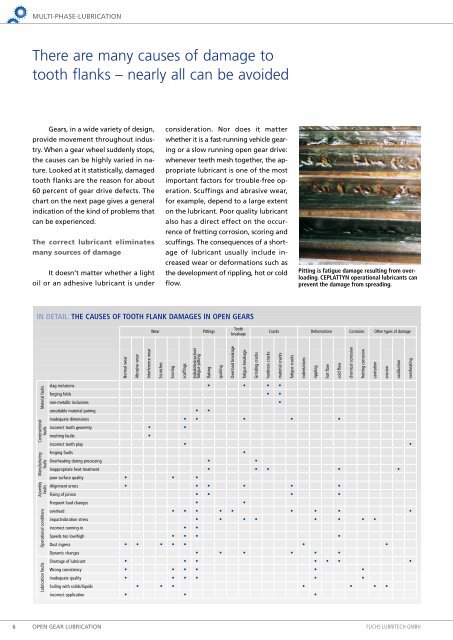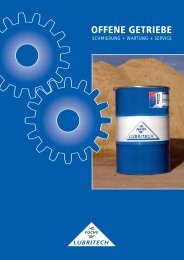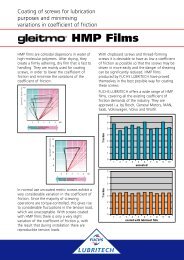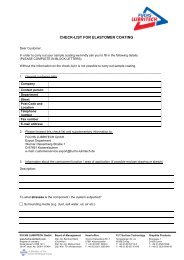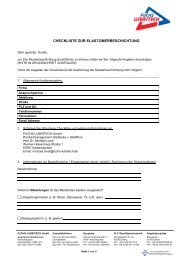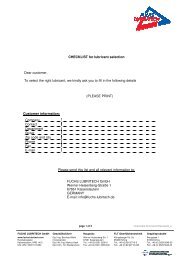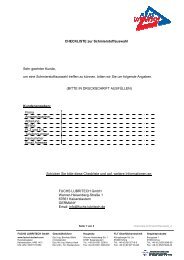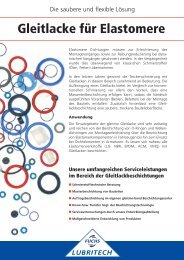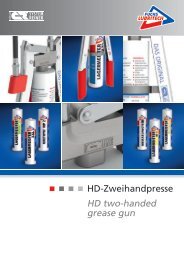english - FUCHS LUBRITECH GmbH
english - FUCHS LUBRITECH GmbH
english - FUCHS LUBRITECH GmbH
Create successful ePaper yourself
Turn your PDF publications into a flip-book with our unique Google optimized e-Paper software.
MULTI-PHASE-LUBRICATION<br />
There are many causes of damage to<br />
tooth flanks – nearly all can be avoided<br />
Gears, in a wide variety of design,<br />
provide movement throughout industry.<br />
When a gear wheel suddenly stops,<br />
the causes can be highly varied in nature.<br />
Looked at it statistically, damaged<br />
tooth flanks are the reason for about<br />
60 percent of gear drive defects. The<br />
chart on the next page gives a general<br />
indication of the kind of problems that<br />
can be experienced.<br />
The correct lubricant eliminates<br />
many sources of damage<br />
It doesn’t matter whether a light<br />
oil or an adhesive lubricant is under<br />
consideration. Nor does it matter<br />
whether it is a fast-running vehicle gearing<br />
or a slow running open gear drive:<br />
whenever teeth mesh together, the appropriate<br />
lubricant is one of the most<br />
important factors for trouble-free operation.<br />
Scuffings and abrasive wear,<br />
for example, depend to a large extent<br />
on the lubricant. Poor quality lubricant<br />
also has a direct effect on the occurrence<br />
of fretting corrosion, scoring and<br />
scuffings. The consequences of a shortage<br />
of lubricant usually include increased<br />
wear or deformations such as<br />
the development of rippling, hot or cold<br />
flow.<br />
IN DETAIL: THE CAUSES OF TOOTH FLANK DAMAGES IN OPEN GEARS<br />
Material faults<br />
Constructional<br />
faults<br />
Manufacturing<br />
faults<br />
Assembly<br />
faults<br />
Lubrication faults Operational conditions<br />
slag inclusions<br />
forging folds<br />
non-metallic inclusions<br />
unsuitable material pairing<br />
inadequate dimensions<br />
incorrect tooth geometry<br />
meshing faults<br />
incorrect tooth play<br />
Forging faults<br />
Overheating during processing<br />
Inappropriate heat treatment<br />
poor surface quality<br />
Alignment errors<br />
Fixing of pinion<br />
Frequent load changes<br />
overload<br />
impact/vibration stress<br />
incorrect running-in<br />
Speeds too low/high<br />
Dust ingress<br />
Dynamic changes<br />
Shortage of lubricant<br />
Wrong consistency<br />
inadequate quality<br />
Soiling with solids/liquids<br />
incorrect application<br />
Normal wear<br />
Abrasive wear<br />
Interference wear<br />
Wear Pittings<br />
Scratches<br />
Scoring<br />
scuffings<br />
Initial/destructive/<br />
fatigue pitting<br />
flaking<br />
6 OPEN GEAR LUBRICATION<br />
<strong>FUCHS</strong> <strong>LUBRITECH</strong> GMBH<br />
spalling<br />
Tooth<br />
breakage<br />
Overload breakage<br />
fatigue breakage<br />
Grinding cracks<br />
hardness cracks<br />
material cracks<br />
fatigue cracks<br />
Pitting is fatigue damage resulting from overloading.<br />
CEPLATTYN operational lubricants can<br />
prevent the damage from spreading.<br />
Cracks Deformations Corrosion Other types of damage<br />
indentations<br />
rippling<br />
hot flow<br />
cold flow<br />
chemical corrosion<br />
fretting corrosion<br />
cavitation<br />
erosion<br />
oxidisation<br />
overheating


